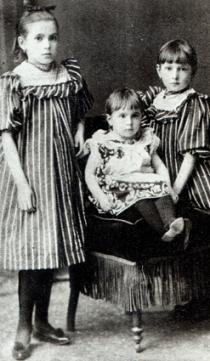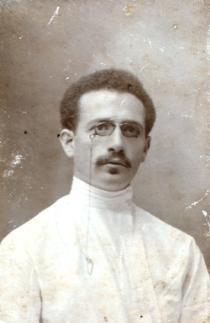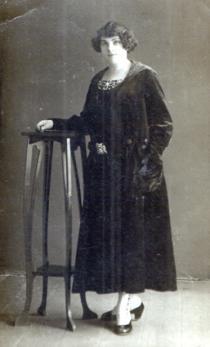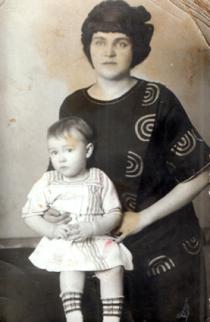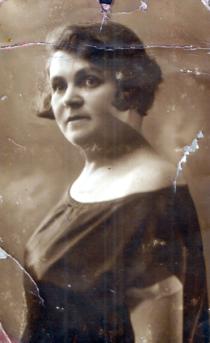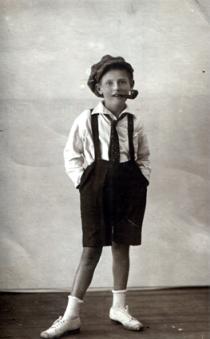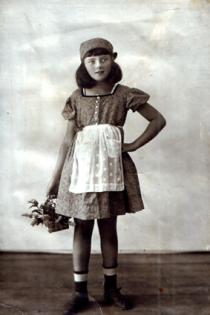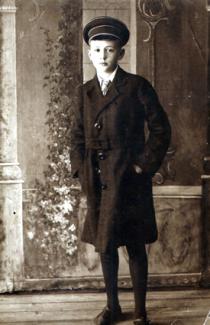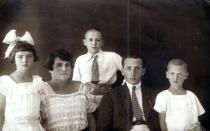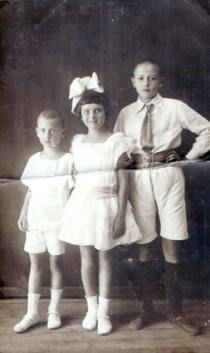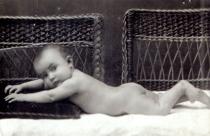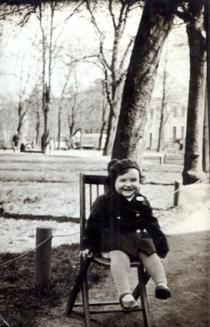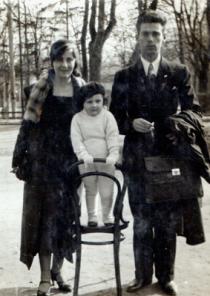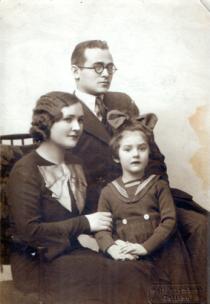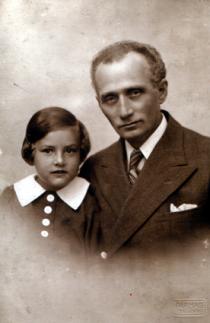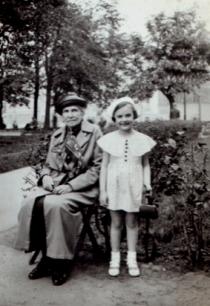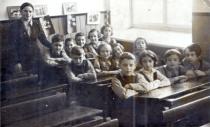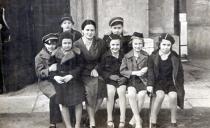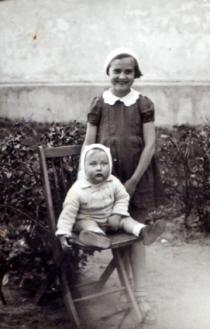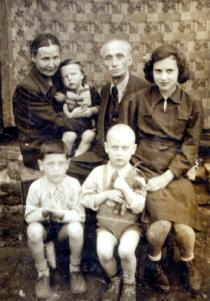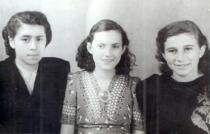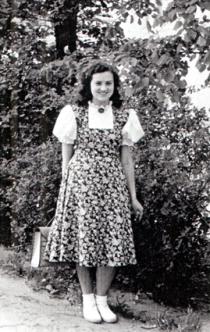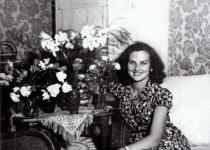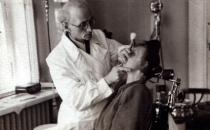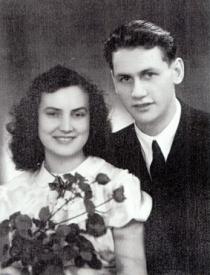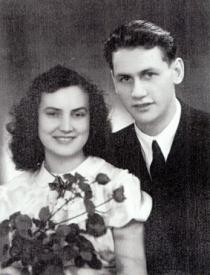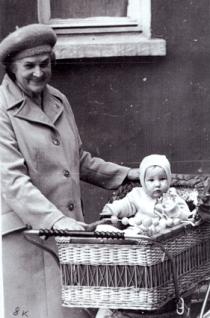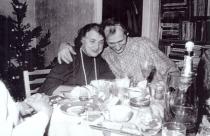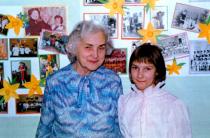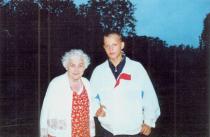
Ester Vee
Tallinn
Estonia
Interviewer: Ella Levitskaya
Date of interview: March 2006
I conducted this interview with Ester Vee at the Jewish community of Estonia 1. Ester is a tall, corpulent lady. She has retained much in common with the girl she is in her childhood pictures, but most of all, her bright childish glance, friendliness and ability to enjoy things. Ester moves quickly, has an upright composure and looks young for her age. She’s very efficient. She’s 75, but she finds time to do many things. She works, sings in a choir, often visits the Jewish community and reads a lot. Ester raises her granddaughter, whose mother left her, when she was a baby. She says she always wanted a daughter, but happened to have sons. And now she has a granddaughter. Perhaps, Karine, who is only 17, makes Ester feel young. She’s a wonderful person, very bright and kind.
The Soviet invasion of the Baltics
My family background
My paternal grandfather, Afrayim Rokhlin, was born in Gomel, Belarus, in 1887. My grandfather’s family lived on the outskirts of Gomel, and his parents were engaged in farming. My great-grandfather’s name was Hirsh Rokhlin, and my great-grandmother’s name was Beyle. My great-grandmother was born in 1847.
There were several children in the family. Besides my grandfather, I knew his sisters Hanne and Riva. As for his other brothers and sister, all I know about them is what I was told. My grandfather was one of the younger children. At some point of time my father started making a family tree, and that was how I happened to know their names, dates of birth and death.
My grandfather’s sister Shifra was the oldest of the siblings. She was born in 1873. Then came my grandfather’s brothers: Yakov, born in 1875, Aron, born in 1877, Boris, born in 1880 and Isaac, born in 1881. My grandfather’s sister Hanne was born in 1885. Everybody at home called her Anne. My grandfather Afrayim was born in 1887, and his younger sister Riva was born in 1890.
My grandfather and his siblings finished a school in Gomel. It was difficult to continue education in tsarist Russia, due to the five percent quota for Jewish students 2. It was quite a challenge to fit into this quota, but still, this didn’t hinder my grandfather from going to Odessa where he entered the Department of Dentistry at the university.
When he graduated, he couldn’t find a job and someone told him that it was easier to find employment in Estonia. He went there and became a dental mechanic. That was when he invited his sisters Hanne and Riva to join him in Estonia. They entered the Department of Dentistry at Tartu University.
Upon graduation, Hanne married Isaj Amitan, a local Jewish man. Her husband was much older than Hanne. He was born in 1863. He was a very religious man. Hanne stayed in Tallinn. She worked as a dentist before she had children. Her older daughter, Sofia, was born in 1915, and her second daughter, Regina, was born in 1917.
My great-grandmother Beyle, who moved to Tallinn in due time, lived with Aunt Hanne’s family. I don’t know whether my great-grandfather ever joined her, or perhaps, he had died before. I knew my great-grandmother Beyle, though. In my childhood we called her ‘Bobe,’ our little granny, to distinguish between her and the ‘big granny,’ my grandmother’s mother, Lea Chapkowski.
Riva moved to Moscow where she got married. Her husband, Leonid Bichuch, born some place not far from Moscow in 1885, was a lung doctor. They had a daughter, whose name I don’t remember.
We had no contacts with Riva and the rest of my grandfather’s kin for a long time. After the Revolution of 1917 3 and the Estonian War for Independence 4 my grandfather and his family happened to live in different countries. It was all right with Estonians to correspond with friends abroad, but for residents of the Soviet Union this entailed great risks 5. For this reason my grandfather lost hold of his relatives.
During the Soviet rule we managed to find some information about his sister and brothers. The only survivor of his kin after the war was Isaac. He lived in Ukraine and died in 1957. The others died young. Shifra died in 1912. Yakov and Aron perished in 1910, but I know no details. Perhaps, they were killed during a pogrom. Boris died in 1905.
My grandfather got married in Tallinn. My grandmother’s family had moved to Tallinn from Poland. My grandmother’s father’s name was Israel-Leib Chapkowski, and her mother’s name was Lea Chapkowski, nee Gordowski. My great-grandmother was born in 1867. They must have got married in Poland, but my grandmother and her two sisters were born in Tallinn.
My grandmother, Eugenia Chapkowski ,was born in 1888. She was the oldest of the three sisters. My grandmother’s sister Bertha was born in 1890, and Elsa was born in 1892. The sisters had nicknames. My grandmother Eugenia was ‘Smarty,’ Bertha was ‘Goody,’ and Elsa was ‘die Sheine,’ the ‘Beauty.’ They finished a gymnasium in Tallinn.
My great-grandfather, Israel Leib, died in 1919. He didn’t only manage to have all of his daughters married by then, but also, to see his grandchildren. My great-grandfather was buried in the Jewish cemetery in Tallinn.
During the tsarist rule my grandmother’s sisters got married and moved to Moscow with their husbands. Bertha married Lazar Blukher, Elsa married Iosif Slonimski. After the revolution we lost whatever contacts with them. After getting married my grandmother was a housewife. It was only my grandfather that was the breadwinner. They had three children.
My father, Jacob Rokhlin, born in 1910, was the oldest. Jacob was the name written in his documents, but for some reason, my father was called Max all his life. I have no idea, why. Even when my father died and his acquaintances read about it in the obituary section of the newspaper, they thought that the newspaper had just confused the names. My father’s sister Miriam was born in 1913, and Boris was born in 1915.
My grandfather wasn’t deeply religious. For his time he was an advanced character. He was a public activist and took part in various Jewish congresses and conferences. My grandfather was a member of the Jewish cultural society and various Jewish clubs. He attended various drama and music centers and even sang in some opera club. My grandfather was a member of the Bialik 6 club in Tallinn. It was a Jewish cultural club. He wrote poems and lectured on Jewish literature. He also took an active part in political life. My grandfather also lectured on political issues and made presentations to young people.
This was the way of life he led. He observed Jewish traditions, but it was a mere manifestation. My grandfather celebrated Jewish holidays at home and went to the synagogue on major holidays. As for my grandmother, I can’t tell how deeply religious she was. I have very dim memories of her.
Their family was rather well-off. The children finished a gymnasium in Tallinn and continued their education. My father’s sister Miriam studied piano and music at the Conservatory in Tallinn. My father and his younger brother Boris studied at Tartu University. My father entered the Department of Dentistry, and his brother Boris studied law. They were members of a Jewish association. My father met my mother, when he was in Tartu.
My mother was born into an Estonian family of farmers in Vyrumaa, in the south of Estonia. They lived on a farm. My mother’s father’s name was Joseph Mandel, and her mother’s name was Elizabeth. They had eight children. My mother Hulda was born in 1910. She had two older brothers, Ferdinand and Oswald, four younger brothers, Elmar, Axel, Richard and Johann and a younger sister, Lisbeth.
My grandmother Elizabeth died young. She was 34. I never saw her, and there were no pictures of her. Of course, it was only fair that my mother’s father remarried. He needed a wife to do the housekeeping and take care of the children. He married a woman from Vyrumaa. They had two children: daughter Magda and son Gustav.
It was very unfortunate for my mother and her brothers and sisters that their stepmother happened to mistreat them tremendously. Estonian women are commonly kind and caring, but this one was an exception. She was always there to harm them in one way or another. She even baked bread for them adding so much salt that it was impossible to eat it. However, she was a good mother to her own two children.
My mother had to work a lot. She studied in a village school, but after classes she had to handle the livestock and look after the younger children. My mother was very fond of handicrafts. She crocheted and knitted mittens and socks. She sold these to earn her living. In summer my mother worked as a shepherdess. She was a good child causing no problems to her parents, but her stepmother had no word of appreciation for her. However hard my mother tried, her stepmother never failed to find fault with her.
The family belonged to the Lutheran church, and there came a time for my mother to attend the confirmation. It’s quite a ceremony in Estonia. Girls wear white gowns to the church. After the confirmation their families give them flowers and gifts. My grandfather was willing to buy a gift for my mother, but his wife didn’t allow him to do this. My mother felt very hurt. She knew how unfair this was. She knew she behaved well and did well at school. She must have felt so very much insulted. She left home. She decided it was about time that she started living her own life. She went to work as a railroad worker. After making some savings she went to Tartu. There, Mama worked as a housemaid for a Jewish family and attended a course of sewing machine operators.
My parents met in Tartu. The family my mother was working for provided meals to students. My father often came for lunch there, and this was where he saw my mother. My mother was very beautiful when she was young, and my father fell in love with her. My mother also fell in love with him.
At that time Jewish men didn’t commonly marry non-Jewish women. It goes without saying that it was hard for my father to make the decision to marry my mother. He had no idea about whether his parents would accept this marriage. However, they got married secretly. My father decided that he would make this announcement to his parents after he graduated from university and became independent.
However, it happened so that my mother got pregnant before my father finished his studies. I was born in 1931. My parents gave me the name of Ester. Even then my father didn’t inform his parents that I was born, but they discovered the fact anyway.
My grandfather was invited to Tartu to lecture on young people’s morals to students. When my grandfather was there, someone from the audience asked, ‘And how about your own son?’ After the lecture my grandfather visited his son and the truth came to light. However, he behaved quite differently from what my parents expected. He met my mother and stayed with my parents for some time before going back to Tallinn.
On the following day he and my grandmother visited my parents in Tartu. They welcomed my mother warmly into their family and treated her like one of them. They brought me a baby carriage and lots of children’s wear. I was their first granddaughter, and my grandmother was very happy. That my mother was Estonian caused no problem. My father’s family accepted my mother in a very warm manner. My mother’s relatives also treated my father like one of them.
Growing up
Before I was born my mother quit her job and earned money by knitting children’s socks and hats, which she delivered to a store. My grandmother and grandfather insisted that my parents left me with them. They believed this would enable my father to dedicate sufficient time to his studies. So I was left with my grandfather and grandmother in Tallinn. My parents stayed in Tartu.
My grandparents loved me a lot. My grandmother and my grandfather’s sister Riva took care of me. The whole family loved and pampered me. After my father graduated from Tartu University my parents moved to Tallinn. My parents rented an apartment, and I returned to my parents. Initially they rented a smaller apartment in Imante Street. I have very dim memories of this period.
My father worked as a dentist, and my grandfather worked with him. My grandfather was a dental mechanic. There were not so many dental mechanics at the time, and my grandfather was considered a highly skilled specialist. He provided his services to a number of celebrities in Estonia. He was well-respected. My father and grandfather’s business improved, and we moved into another apartment on Viru Street. There were seven rooms in this apartment. My grandfather and father set up a dentist’s room where they received their patients.
My grandmother Eugenia had passed away by that time. She died in 1933, when I was two. My mother told me that my grandmother simply adored me. She fell severely ill and she had to go to hospital. She recovered, and the family came to take her home, when all of a sudden she had coronary thrombosis. She died instantly. It was a premature death. My grandmother was buried in the Jewish cemetery in Tallinn. Her mother, my great-grandmother Lea Chapkowski, lived four years longer than her daughter. She died in 1937.
We spoke Estonian at home, but it wasn’t because my mother was Estonian. My grandmother and grandfather also spoke Estonian. They knew Yiddish and so did their children. I also knew some words in Yiddish, but not sufficient to communicate in Yiddish. I often mixed Estonian and Yiddish words. I learned to write and read in Estonian at the age of four. I couldn’t understand why some letters were dotted and others were written with a small tilde. I wrote all letters with this tilde saying that it was a fair thing to do. It took me almost a year to write letters properly.
When I learned to read, I spent much time reading. Stories about children were my favorite. I had several Estonian books about children, and I loved them a lot. I knew them by heart, actually, but this never stopped me from reading them again and again. I also liked drawing and spent a lot of time drawing.
My mother had a knitting machine. She knitted nice striped socks for children. Mama also made very beautiful dolls. She bought celluloid heads and made the bodies herself stuffing them with sawdust. Then Mama made lovely dresses for the dolls and designed their outfits. She also made dolls for me. They were my favorite toys. I played with my mother’s dolls and often took them with me to the kindergarten and later to school.
I often visited my grandfather. He loved me dearly, and after my grandmother died he became particularly attached to me. He was very sociable and had many friends. They often got together, and my grandfather took me with him to their gatherings.
Our acquaintances called my father a genius and a walking encyclopedia. My father enjoyed learning new things. He read a lot. He was aware of all novelties in dentistry and also read fiction. My father used to read while he was having meals. He had an amazing memory. He remembered everything he read about. However, he was rather absent-minded where routinely things were concerned. My mother always had to watch him. He was like a child.
Neither my father, nor my mother was religious. They didn’t go to church or the synagogue. Thinking about them now, I would say there were atheists. However, we observed Jewish and Estonian traditions at home. At least, we celebrated holidays. My parents loved each other dearly and didn’t want to offend each other by ignoring the national traditions of each other. My father used to joke that our family had one foot here and another foot there.
My mother learned how to make traditional Jewish food. On Jewish holidays she made gefilte fish and she baked hamantashen on Purim. We always had matzah on Pesach. My father and my mother decorated the Christmas tree together. We had painted eggs and Easter bread at Easter. At Christmas we received gifts from Santa Claus and at Easter rabbits brought us lovely Easter eggs. I knew both Jewish and Estonian traditions. Thinking about this now, I believe this added to my spiritual development.
On Jewish holidays the family gathered at my grandfather’s sister Hanne Amitan’s home. Hanne’s husband Isaj was very religious, and Hanne strictly observed Jewish traditions. They celebrated Jewish holidays and Sabbath and went to the synagogue. There was a large and beautiful synagogue 7 in Tallinn before the war. I was too young and can’t remember whether my parents took me with them to the synagogue. All I remember is a celebration of Simchat Torah at the synagogue. My grandfather took me there.
On holidays Hanne made traditional festive food. My grandfather, my father’s sister and brother and their families and our family got together at their home. Hanne’s husband’s relatives also joined us. At Pesach her husband conducted the seder. All Jewish traditions were followed strictly.
I can remember one Jewish holiday celebration. I believe it was Purim, when quite a number of children got together. I was the youngest. Adults started asking children what they would like to get for a gift. Some wanted dolls, toys, toy cars, a ball, but I said ‘a book.’ They burst out laughing. I didn’t know what was so funny about what I had said. I said the word ‘book’ in Yiddish, and I thought they were laughing because I mispronounced it. On the following day I got a few nice books with many illustrations.
In 1935 my mother’s father died. I knew little of him. My parents went to the funeral, and I stayed with my grandparents. My mother’s favorite brother Ferdinand died shortly afterward. He was a conscript in the Estonian army and fell ill with some disease. I think it was diphtheria. He died and my parents went to the funeral again.
These two deaths scared me a lot. This was the first time I heard the word ‘death’ and I understood that everything comes to its end in life. I understood that death was irreversible. I felt very scared about this. I had a fear that my mother might die, and this fear never left me. Every morning I ran to my parents’ bedroom to see whether my mother was alive.
Once, Mama used this fear of mine to her benefit. I was playing up, and she couldn’t calm me down. She finally told me that if I didn’t stop, she would die. She sat at the table and laid her head on her hands. She didn’t move. I started crying and asking her forgiveness, but she still didn’t move. Fortunately, my father was back from work. I ran to him yelling, ‘Father, Father, Mama is dead!’ He knew what it was about and told me to go and tickle Mama. I did so, and Mama jumped up. Then this fear of mine disappeared, but I can still remember it.
When I turned five, I went to a Jewish kindergarten. The children were prepared for the Jewish school in this kindergarten. I improved my Yiddish there. I have very good memories of the kindergarten. Our teacher was Fania Dubowskaya. She was like the sun sending out warm rays around her. Perhaps, Fania influenced my choice of profession.
When I turned six, I went to the Jewish gymnasium 8. Actually, they admitted eight-year-old children to the gymnasium, while I had just turned six in August and went to school in September of the same year. I don’t know why it happened so. Perhaps, my mother wanted to know how I would manage my studies, considering my insufficient Yiddish. If I failed, they would have sent me to an Estonian school the following year. However, I did well from the very start at school.
On my first day I was so excited that I don’t remember anything about it. All I remember is that I badly needed to go the ladies’ room, but there were strangers around and I was too shy to ask the way. One girl in a red dress came to my rescue and showed me the facility. She happened to be in my class and we became the best of friends, though she was two years older. I heard that she died recently.
There were two classes at school: one Yiddish and one Hebrew. I joined the Yiddish class. The children of wealthy and renowned Jews of Tallinn studied in the Hebrew class, while in the Yiddish class there were children from common families. We had the same teachers, though. I remember that our teacher of Jewish religion and history was Gurevich, the chazzan of the synagogue of Tallinn. He also taught us singing.
My father’s sister Miriam finished the Conservatory and worked as a music teacher. Miriam married Moisey Shaz, a Jewish man from Tallinn. Miriam’s husband came from a very religious family, and they observed all Jewish traditions at home. Miriam had two sons, Eugene, named after Grandmother, and Leonid.
My father’s younger brother Boris also lived in Tallinn after he graduated from Tartu University. He was a lawyer. Boris also had a non-Jewish wife like my father. His wife Maria was half-Russian and half-Estonian. However, they made a very good couple. Boris’s wife finished Art School in Tartu. She was an artist. She was pregnant twice, but both times things didn’t work out for them, and she never got pregnant again. They had no children.
During the Estonian rule there was no pressure on Jewish children. I can’t remember one single manifestation of anti-Semitism. Jews were also very friendly to others. There was no division between Jews and non-Jews. My parents had Jewish and non-Jewish friends, and I made friends based on other than nationality considerations. There was no nationality-based confrontation, except that there were jokes about Jews, but I only heard Jews telling them.
Konstantin Päts [1876-1956] was a very efficient president of Estonia. His policy was based on equality of the people living in Estonia and the protection the state provides to them. People liked Päts. He was also a good and kind person.
Once I watched a puppet show sitting on the lap of our president. There was a children’s playground in the central park in Tallinn where parents could leave their children for the day. There were teachers taking care of the children. My parents took me there several times. I liked it there a lot.
Once I came to the playground on a rainy day. Our teachers took us to the presidential palace located in front of the park. There was a puppet show in one room in the palace. I was the youngest in the group of children, and I had a seat in the first row. All of a sudden the president entered the room. He came to the first row, lifted me and stood there holding me. I was afraid he wouldn’t let me watch the show, but he just sat down holding me in his lap. So I watched the whole show sitting in his lap.
Since this incident I liked Päts a lot. I believed he was a very kind man. When in 1940 our country acceded to the Soviet Union 9, and the Soviet government arrested Päts, I couldn’t understand why they did it. What could they possibly have had against the kind man that he was?
I loved children and was dreaming of having a little brother. Whenever my family asked me what kind of gift I wanted, I always replied: a brother. Adults always laughed at this for some reason, giving me dolls or drawing albums, etc.
In summer 1939, when I was eight, I went to a school summer camp. I devised a little game for myself. There is a children’s game with a stone, which you throw up and then have to catch. I dreamed up that if you catch the stone a hundred times, and it doesn’t touch the ground, then it would become a lucky stone. Then you had to leave it where it could easily get lost. During the day lucky stones are still, but at night they move to a happy land. When these stones got there, they made your dearest wish come true. My cherished wish was to have a brother.
All children knew about it, and each time I thought of this wish. Of course, other children kept teasing me saying that stones were not to help in my case. One day I received a letter from my father where he wrote that on 25th July [1939] my little brother was born. All of a sudden all children believed in lucky stones. Until the very day of departure the children kept throwing up their lucky stones.
My baby brother was given the name of Leo. I loved helping Mama to take care of Leo. I quite forgot my dolls. All I could talk about was Leo and how he learned to smile, how his first tooth was growing. I always had stories to tell my friends.
In 1939, during the war in Poland 10, many Jewish refugees flew to Estonia. Local Jews provided whatever assistance they could to them. This was the first time I heard about Hitler and about the atrocities. It seemed very bizarre to me. I didn’t know why Hitler would hate Jews. All Jewish people I knew were decent and very good people. I cannot think of one person I could say something bad of. Trying to explain this thing to myself, I decided that it was our language that made Hitler angry with our people. Yiddish sounded very much like German, and he probably decided that Jews were imitating Germans. At least, this was some explanation of why Germans hated Jews so much that they even wanted to kill them.
The Soviet invasion of the Baltics
In 1940 Estonia became a Soviet Republic. Our gymnasium became a Jewish elementary school. The teachers and principal of the school stayed. There was no Hebrew class retained. The two classes became one. Yiddish was the language of teaching. There was one boy in that Hebrew class. His name was Baskin, and he is a popular showman now. When he came to my class, he kept teasing me. He retold my stories about my baby brother in such a manner that made the class burst out laughing. He drew funny caricatures of my baby brother and gave him various nicknames. It drove me to tears.
I usually didn’t split on others, but one day I complained to the class tutor. This didn’t help. So I went to the principal. Gurin was an amazing person. I don’t know how I dared to complain to the principal of the school. But I told him all. Gurin listened to me with all his attention and gave me the following advice. He said that Baskin kept pestering me, because he saw my response, and he enjoyed it. If I ignored him and stopped crying, this would stop entertaining him and he would stop teasing me. This inspired me a lot, but I never got a chance to apply the advice, because of the war 11.
In 1940 we became pioneers 12 at school. I didn’t quite know what it was about, but our whole class joined the pioneers and so I didn’t refuse, of course. I remember learning some songs in Russian during our music classes. I don’t think any of us knew Russian, and this was like a set of meaningless sounds that we were learning by heart. Only after the war I came to understand what these songs were about.
I can’t say what my parents thought of the Soviet power. I was too young to make whatever conclusions, and my parents didn’t discuss any political issues in my presence. They may have worried that I might say something outside our home. At that time there was already political pressure on people. Anyway, I lived unaware of any politics. All I remember from this time is how a red flag was installed beside the Estonian flag on the Town Hall. Then the Estonian flag disappeared.
Soviet authorities took away my grandfather and father from their dentist office. My father was appointed to the position of a physician in the town of Kähri. This is a small town nowadays, but back then it was a village near Tallinn. My father didn’t want to go there. He asked whether it was possible for him to stay in Tallinn, particularly considering that he had a son. My brother was one year old then. He wasn’t allowed to stay in Tallinn, and my mother followed him to Kähri.
My parents decided that I had to stay in Tallinn to finish the 4th grade of the Jewish school. Our apartment was seized, and I moved in with the Amitan family, my grandfather’s sister Hanne. I stayed with them for a year. I also attended music classes. My father’s sister Miriam was a music teacher, and she insisted that I learned to play the piano. My aunt was my music teacher during this year. My aunt’s husband came from a very religious family, and they celebrated Sabbath. I went to the Sabbath lunch at my aunt’s on Saturday. I stayed at my aunt’s overnight, and on Sunday I joined my parents in Kähri.
In May 1941 my second brother was born. He was given the name of Arno. I was delighted and couldn’t wait till summer came to spend more time with my little brother.
During the war
Fortunately, the resettlement in Estonia on 14th June 1941 13 didn’t affect our family. There were no wealthy people or politicians in our family. One week later, on 22nd June 1941, the war began. Hitler’s army attacked the Soviet Union. On that very day I was with my parents in Kähri. The academic year at school was over, and I was to spend the summer with my parents.
My father was mobilized right away. He was a doctor, and all doctors were subject to call-up, whatever the specialty. My father insisted that we evacuated from Estonia. He was appointed as chief of an evacuation train, so we evacuated as a family, including my grandfather. The families of my father’s sister and brother and my grandfather’s sister Hanne Amitan also evacuated, but separately from us. Only Hanne’s husband stayed in Tallinn. He bluntly refused to leave home and there was no way to convince him otherwise. He perished on the first days of the German occupation. This was what we found out after we returned home from evacuation.
I have dim memories of our trip. My mother had a two-month-old baby, and I had to take care of my brother Leo, who was not yet two years old. We reached Siberia, and all Estonians were sent to the village of Nizhniaya Uvel’ka, near Krasnoyarsk [Russia, about 3000 km from Moscow]. My father had to move on to join his military unit.
We stayed at Nizhniaya Uvel’ka. This was a wealthy village. The villagers were Ukrainian farmers resettled in the 1930s as kulak farmers 14. The term kulak was extensively used in the Soviet political language, originally referring to relatively wealthy peasants in the Russian Empire who owned larger farms and used hired labor. They were not allowed to take any belongings with them, when leaving for Siberia. However, they were hardworking and efficient people. They built houses, made vegetable gardens and were breeding cattle in the Siberian taiga. Many died during the first year, when they had no provisions, but the survivors made the best of what was available. Many of them had beehives and honey. Many kept geese, and flocks of geese were waddling about the village.
All Estonians were initially accommodated in a large premise. Perhaps, it was at the railway station, but I can’t remember for sure. Later we were accommodated in a little hut, which had a large Russian stove 15. Our landlords lived in a large house. Only my grandfather could speak Russian. We had hardly any luggage with us. My mother had three children with her, and she could hardly carry much. She needed a number of diapers and baby clothes for the baby.
This made our stay rather hard, not only because of the severely cold winters in Siberia as compared to the mild winters in Estonia, but also because the locals didn’t want to sell their food products for money. They traded them for clothes. My mother received monthly allowances for my father’s service, but she couldn’t buy anything. Other families had clothes and valuables that they could trade for food, but we had nothing of value with us.
However, we managed to save Leo and little Arno from starving to death. I was fond of drawing. I drew paper dolls and pretty dresses for them. I also made doll-house furniture from paper. There was no place to buy toys, and my paper toys became very popular in the village. The villagers gave me milk for my toys.
My mother went to work at the wood-cutting ground. They cut trees, cut off the branches and bundled up the trunks, and my mother’s job was to haul them from the woods. She had a little bull that hauled these bundles. In winter Mama’s feet were frostbitten. The temperature dropped to minus 40 degrees Celsius. Since then, when it got cold, her feet always turned purple. I was responsible for the children while Mama was at work. In winter we stayed on the Russian stove bench. We didn’t even have anything to wear to go outside.
Another Jewish family from Estonia lived in the house next to ours. They had a daughter. Her name was Lina. She and I were the same age. She visited us every now and then and we played for days.
Another discomfort for us was lack of toilets in the village. The villagers did it all in their gardens, even in winter. It was hard for us to get used to this. Another surprising thing to me was that there was a lot of theft in the village. I remember Mama washed my warm underpants and hung them on the line outside. They were almost brand new underpants, and they were stolen right away. However, my mother was a very strong-minded person. When our landlady’s daughter invited her friends, my mother went to their house where she lifted all the girls’ skirts until she found my underpants. She took them away from the girl.
The first year was very hard. Not all people had a friendly attitude. Every now and then one could hear things like, ‘There they came to eat our bread.’ Gradually their attitudes improved. I remember that there was a representative of some charity organization in our village providing assistance to those who were in the evacuation. They provided food and second-hand clothes. This was the assistance we all needed.
My mother sent me to the Russian school, but I couldn’t understand anything in class, not knowing the Russian language. Even when they asked me my name, I didn’t understand the question. I attended school for a couple of weeks before my mother decided it was enough. One day an Estonian school was established in Nizhniaya Uvel’ka. They rented a house, and all children went to one class. There were a few teachers from Estonia in the village, and they taught the children.
I attended this school, but I failed to finish the 5th grade. I fell severely ill. I had rheumatism. I felt terrible pain. It was so strong that I couldn’t dress or undress myself. My legs and my arms were aching. I couldn’t go to school. Besides, I had appendicitis. There was no hospital in Nizhniaya Uvel’ka. My grandfather corresponded with his sister Hanne. She was in evacuation in Nizhniy Tagil, Sverdlovsk region [Russia, about 1500 km from Moscow] where she worked as a dentist in the town hospital. My grandfather wrote to Hanne, and they decided I should go to Nizhniy Tagil.
I went there with my grandfather. We were to change trains in Sverdlovsk. It was there that I told my grandfather to leave me and go on alone. I sort of sensed death. This is all I can remember. I regained consciousness at some family’s place in Sverdlovsk. They had evacuated from Moscow, and they gave shelter to my grandfather and me. Besides rheumatism and appendicitis the doctors discovered that there was something wrong with my lungs.
When I felt a little better, my grandfather and I headed to Nizhniy Tagil. I was taken to hospital there immediately. They had to wait until my lungs were in a better condition before they could operate on my appendix. Later it turned out that the appendix operation was no longer necessary. In the hospital my lungs got better, and I spent two summers in a row in a mountain recreation center near Sverdlovsk. After I was released from hospital my grandfather made all necessary arrangements for my mother and the children to come to Nizhniy Tagil, where we stayed, until it was time to go back to Tallinn.
We corresponded with my father. He served in the front-line medical unit where the wounded were taken directly from the battlefield. This medical unit belonged to a Russian regiment, but when the Estonian Corps 16 was established, my father was transferred there. He served in the Estonian Corps till the end of the war.
We received my father’s triangle letters from the field post regularly. We wrote letters in Russian. All letters from and to the front line were subject to censorship, and Russian censors were faster than the Estonian ones. Writing letters in Russian was difficult for us initially, but gradually we improved our writing and reading skills.
My father also wrote that they had an amateur music group in their unit and he played the piano and the accordion, accompanying singers. Needless to say that we tried not to mention our everyday difficulties, considering that he could do nothing to help us, while if we had, it would have only raised his concerns.
In 1943 I went to school in Nizhniy Tagil. I went to the 5th grade of a Russian school since there was no Estonian school in the town. Of course I faced difficulties. However, I was eager to study well, and I dedicated much time to my studies. However, my Russian was so poor that I just couldn’t retell what I had read in Russian as well as I could have done in Estonian. In the first quarter of the academic year I had very low grades in my school record card. When my Russian improved, my grades improved as well. The only poor grade I had at the end of the academic year was in military discipline. So I finished the 5th grade in Nizhniy Tagil.
My brother Leo went to the kindergarten. The children got meals there, and this was the best solution for our current problems. There was a funny incident in the kindergarten, which I remember well. In Estonian families children address their fathers’ parents with ‘pappa’ and ‘mamma,’ while their mothers’ parents are ‘grannies.’ We addressed grandfather Afrayim with ‘pappa.’ In Russian families they address the father in this way.
One day the director of the kindergarten invited my mother to visit her. Mama didn’t know what it was about. The children were well educated, polite, clean and well-groomed. The director started telling my mother off. My mother could tell by her expression that something had made her very unhappy. But Mama’s Russian was so poor that she couldn’t get what was wrong. As it turned out, Leo had said in the kindergarten that his papa was at the front, but that his pappa lives with us. The director’s point was that my mother’s husband was at the front, but she had another man living with her. When the reason of the director’s unhappiness became clear, it made us laugh a lot.
My classmate, who was also our neighbor, was my closest friend. She often visited us. Well, it happened so that she stole our photographs, the only valuable thing that my mother had brought along. Fortunately, I saw these photographs at her home and took them from her. She had written on the back of all the pictures: ‘For the memory, to dear friend Klava from Esther.’
I missed Tallinn a lot throughout the years we spent in evacuation. Each day, when I went to bed and before going to sleep I closed my eyes imagining what it would be like to come back and go for a walk in Tallinn… I was so homesick that I cannot express it in words. How I dreamed of my hometown and my homeland! I wasn’t the only one.
I made notes of what my brothers were saying. I remember a game I played with Leo. One of us said a word and the other was to add a corresponding word to make a pair of words. I said ‘locomotive’ and my brother happily said that we would hitch a ride to the locomotive and go home to Estonia!
After the war
In November 1944 we heard that Estonia was free from fascists, and we started our preparations to go home. I remember our train approaching the railway station in Tallinn, and I could already see the towers of the Old Town and I had such an amazing feeling of tenderness towards my town. It cannot be expressed in words. On our way home we saw ruins all around.
Our house was also ruined. Our family and other doctors’ families were accommodated temporarily in a house in the vicinity of the psychoneurological hospital on Paldoskimante Street. This was the house of the chief doctor of the hospital who had emigrated during the war. One half of the house accommodated a kindergarten, and the other part living quarters.
I remember, when Leo came home after his first day in the kindergarten, he said how surprising it was that all the little girls had long hair. You see, the children’s heads were shaved in his kindergarten in Nizhniy Tagil to protect them from lice, and Leo believed that children’s hair didn’t grow before they went to school. Leo spoke Russian while we were in evacuation, but when we returned home, he switched to Estonian, and very soon he forgot his Russian. However, he didn’t have any problems with the language at school.
The Estonian Corps was near Tallinn, and one day my father visited us. It was four years since he had last seen us. When he saw Leo previously, he was six weeks old, and when he returned to Tallinn, Leo was a four-year-old boy. My father missed us so much! He loved his children dearly. He came to see us as soon as he got an opportunity to get a few days leave.
On his was home a funny thing happened. My father didn’t like the cold. Despite his four years in the army, my father remained a purely civilian man. It was cold, and my father found a thick woolen scarf that he wrapped around his neck on top of his overcoat. There were caricatures of German soldiers wrapped up in scarves and women’s shawls in the newspapers. They confused my father for a German deserter and detained him. It took my father quite an effort to prove that he was none of them.
Finally, he came to Tallinn and took a cab. The address he told the cabman was 52, Paldiskimante Street. Everybody in Tallinn knew this was the address of a mental hospital! My father’s overcoat looked quite shabby, and there was a scarf over it. Besides, he kept telling the cabman to go faster and faster. It was some time before my father noticed that the cabman was staring at him in horror: could it really be that the man was in such a hurry to get to the mental hospital? My father stayed with us only for a short time. Only after the war he demobilized and returned home to be with us for the rest of his life.
We stayed in Tallinn until spring 1945. Life was very hard. There wasn’t sufficient food. The war was still on. In early spring 1945 we moved to my mother’s relatives in the village.
My mother’s brother Oswald had been drafted into the Soviet army at the beginning of the war. He disappeared. There was no information about him. We tried to find out what had happened to him, but all in vain.
My mother evil stepmother’s family was deeply affected. Her daughter Magda was just a little older than myself, and when I was a child, my mother always held her up as an example: she had accurate and clean notebooks, and she was excellent at handicrafts. This girl was of great authority to me. She was very pretty. When the Germans were retreating from Estonia, a German soldier raped her.
As a result, Magda had a nervous breakdown, and on top of it all she got pregnant. Her condition was bad. At times her mind got so blurry that she couldn’t remember her name. She wasn’t able to take care of the baby either. When we came to the village, this baby was lying in his bed, and he had black spots all over his face. They were left by flies. Later my mother’s brother Axel adopted this child. His wife and he had no children. As for Magda, she had to go to a home for the disabled where she died.
Gustav, the younger son of my mother’s stepmother, was a naughty boy, and I didn’t really like him. He used to break and damage my toys and interfere with our playing games. He was 15 when the Germans were retreating from Estonia. They must have been in bad need for additional staff, and they mobilized young people like Gustav. He was one of those. Since then nobody heard anything about him. He must have perished on a battlefield.
The wicked stepmother also perished. She went to the woods to gather some brushwood and injured her legs. She developed gangrene. She had a surgery in Tartu. She had both legs amputated, and she died in hospital. It was like life took revenge for all her wicked treatment of her stepchildren.
I remember 9th May 1945, when the war was over. Nowadays politicians try to take advantage of this topic. They are saying that the German occupation was replaced by the Soviet occupation, but back in 1945 we saw it differently. I remember it well. It was a lively sunny day in May, when my mother’s brother Axel came into the house. He was so happy and full of joy. He had a newspaper in his hand. He came in shouting, ‘The war’s over!’
All of my mother’s kin were farmers. They were no supporters of the Soviet regime, but then all of them were happy that the war was over, and that men wouldn’t have to go to the army, and there would be no more death notifications, and no more bombs dropped onto our towns by the Germans. This was what mattered. Adults and children, too, had to go through all horrors of the war.
In summer 1945 we returned to Tallinn. My father was back home. He went to work. Our family received three rooms in a shared apartment 17. The Soviet authorities didn’t reopen our Jewish school after the war. I met with some former classmates. They told me that many had been lost to the war. Actually, all of those who failed to evacuate, perished during the first months of the war.
My father was deeply affected by his medical service. He saw wounded people, blood and suffering and death every day. It was all extremely hard on him. Perhaps, it was for this reason that my father decided to give up medicine after he came back from the front. He went to work at the medical library in Tallinn. He started as a bibliographer, and later he was promoted to director of the library. He needed to know both medicine and foreign languages in his work.
It’s amazing that my father was never a member of the Communist Party, while working as director. Soviet officials were required to be party members. My father’s valid excuse was that when a student of Tartu University, my father was a member of the Jewish students’ corporation. When he was offered to join the Party, he mentioned this fact and they let him be.
In November 1945 my sister was born. According to her documents, her name is Tamara, but she was always addressed as Maja. I was 14, when my baby sister was born. I loved her so much! I had spent a lot of time with my younger brothers, and when my sister was born, I dedicated much of my time to her. I made notes of everything the children said and the games they thought of. However, it never occurred to me that this would become the cause of my life.
My brothers and I had no problems with the new Soviet life rules. We had spent over three years in evacuation, and this was something we got adjusted to. I don’t know what my father or mother thought about the Soviet rule. In our family the children were not involved in any political discussions. The only thing I noticed then was that my father continuously listened to the Voice of America 18. This was not allowed in the Soviet Union.
My father never discussed what he had heard with our mother in our presence. I thought it was strange that he wanted to tune to the Voice of America to listen to news, when the news was broadcast on the Soviet radio. However, I never asked my father about it, and in any case, I don’t think he would have had an answer for me.
My father was good at music. I don’t think there was an instrument he couldn’t play. We didn’t have a piano, but when we visited friends and they had a piano, they always asked my father to play. He could play whatever they asked him, whether it was a Beethoven sonata or a popular song. He didn’t use any notes and played from memory.
Once, somebody asked him to play some anthems. My father played a number of various anthems. Then, I remember, everyone came to a standstill, when my father started playing an old Estonian anthem. This was a risk during the Soviet period, in case somebody from the outside could hear it and report it to authorities. This might have led to many problems for the people attending the party. My father said quietly, ‘You don’t have to worry, I’ll tell them this was a Finnish anthem.’ The Estonian and Finnish anthems sound very much alike.
Besides music, my father was very good at languages. He could speak ten European languages, and there was no text in any language that he couldn’t translate. Once we received a letter from Georgia, and my father translated it for me with the help of a dictionary. This wasn’t easy, of course, but he managed. My father subscribed to medical journals and the ‘Literature and languages’ journal.
In September 1945 I went to the 6th grade of an Estonian school. At that time there were schools for boys and girls in the Soviet Union. In our school we had classes for boys and classes for girls. We only met at all-school events. I became a pioneer in 1940. All of my classmates were pioneers. Only in exceptional cases children didn’t become pioneers. This was a serious punishment for misbehavior.
I wore my pioneer necktie, when I came to my Estonian school on the first day after we returned from evacuation. I saw that none of the children had his or her pioneer necktie on. I took mine off and put it into my pocket. Estonian children, who hadn’t evacuated from Estonia during the war, had a very different attitude toward the Soviet regime. They were not eager to become pioneers, and there were only a few Komsomol 19 members at school. District party committees obliged school principals to have a certain number of Komsomol members, or otherwise, they were at risk of losing their job for the failure to educate the Soviet schoolchildren according to the best spirit of Soviet traditions. They might even have been subject to resettlement, considering the circumstances. Children joined the Komsomol in the 7th grade.
I was a decent student and behaved appropriately. Therefore, it was quite a surprise for me, when the principal of our school approached me during an interval and told me to follow him to his office. I knew I had done nothing wrong, and didn’t know why he wanted to talk to me. I felt rather ill at ease and felt like a mouse before a lion. The principal sat at his desk, and I sat at its opposite end. For a few minutes he sat looking at me in silence. I was overwhelmed with fear, not knowing what might have happened. After a few minutes of silence he asked whether I wanted to join the Komsomol. I agreed without hesitation. After this fear it never even occurred to me to refuse.
During another break the school Komsomol leader approached me informing me what kind of documents I had to submit and what I had to know for the interview. I couldn’t even understand what he was saying. I only wished the earth could have swallowed me up. I didn’t talk much to boys at all, and there was a boy telling me something…
To cut a long story short: I became a Komsomol member. As for our school Komsomol leader, he even didn’t get a chance to finish our school. His family became subject to repressions in 1948. When he returned from exile, he became head of the Estonian organization of repressed people, and in the 1990s he was even nominated for election to parliament, and issued flyers with his biography, in which there wasn’t a word that he had been our school Komsomol leader. He has passed away already.
The 1948-49 repressions mostly concerned the farmers. A whole family became subject to resettlement, and they were those called ‘kulak’ in Russia. They were efficient and wealthy farmers. There were many of those in Estonia. Estonia was known for its agricultural products that it exported all over the world. Many farmers from the village where my mother’s relatives lived were resettled. Many villages lost their population. Fortunately, my mother’s brother remained safe.
There were also repressions in towns. Our school principal, a Hungarian, a very decent person, was well respected. He only worked for one year, when we heard that he had been arrested as an ‘enemy of the people’ 20. It was beyond our understanding how a decent person could be an enemy of the people. This was quite a surprise to us.
I put much effort into drawing. I liked drawing patterns and I wanted to become an artist to paint on fabric. If I saw a lady wearing a dress made from patterned fabric, I used to walk after her looking at the pattern. I had no doubts about the profession I wanted to choose. I was going to enter the College of Art in Tallinn. At that time it was called the College of Applied Art, and I chose the Department of Applied Art.
When I was in my last year at school, I entered the pre-training course at the College of Art. Frankly speaking, I didn’t quite like what we were doing. For most of the time we painted cast heads, and this was what I cared the least about. Based on the results of this training graduation contest I was included in the list of those, who were recommended to enter the college.
I finished school with a silver medal [Editor’s note: a golden medal was the highest distinction in USSR secondary schools. A student was supposed to have straight excellent marks (100%) to get the golden medal. A student was supposed to have 90% of excellent marks to get a silver medal]. This gave me the right to skip entrance exams to any college, but only during the first year after finishing school. This silver medal spoiled it all.
When at school, we had five to six exams after finishing each year, while after our last year at school we had to take 11 exams! I’d always been an industrious student and studied many additional materials. I was so tired of these exams that I hated the thought of taking more exams.
If I wanted to go to the College of Art, I would have had to just take one exam, while skipping other exams in general subjects. This one exam was to be the specialty. This exam took a few days. The competition in this College was high, considering that there were entrants from all over the Soviet Union in Estonia. There was noted anti-Semitism over there, while in Estonia Jewish entrants could enjoy equal rights provided they received appropriate grades. I was not dead sure that I would manage the entrance competition, and if I failed, I would have had no exam-related benefits during the following year.
I started looking through higher educational establishments reference books, when I saw the pre-school department of the Leningrad Teachers’ Training College. I always liked children and liked spending time with them. I thought this might be interesting for me. From then on I put aside whatever doubts about going to study in Leningrad. I obtained a notice to proceed with my education from the local office for public education. They also indicated that upon graduation I was to go to work at the Teachers’ Training School in Tallinn.
There were 13 young people from Estonia to go to study in Leningrad. We went to the same college, but different departments. We were admitted and accommodated in a dormitory. The academic year started on 1st September. My Russian was not sufficient to understand the lectures. In my group I was the only Estonian. It took me about six months to improve my Russian, and I had no more problems with my studies.
However, my first year at the college was very dull. We continued studying what we had had at school. It was the same literature and history. We didn’t study foreign literature at school. We had a half-year course of foreign literature, when we just wrote down the names, years of life and the major works of the most known foreign writers, and it was the same in my college. We never came to reading the works.
I was jealous of the students of the department of mathematics. At least, they were learning something new. A friend of mine from the department of mathematics told me to join her department, and I quite felt like doing it, but the thing is, such is my character that when I promise something, I have to do it. My country sent me to study to be a pre-school teacher and to go to work at the Teachers’ Training School. They were counting on me and I couldn’t let them down. This was my way of thinking. I considered the option of joining another department, but I didn’t dare to do this. Later, when we started studying the political economy, I liked this subject and this was the end of my regrets.
I spent a lot of time studying. I didn’t date any guys or join my friends from the dormitory to go dancing. Firstly, I enjoyed studying, and secondly, considering that I studied a foreign language, it was more difficult than for my friends. I never missed lectures or failed to make notes. During the exam period my group mates waited for their turn to have my notes to prepare for their exams. I had the highest grades in almost all subjects.
Once I even had a conflict in this regard. My roommates and I were having tea, when one said that I got my grades just for my pretty eyes. This was quite an offense to me, considering that I put in much effort to get these grades. I couldn’t control myself and threw my cup of tea onto the girl.
This fact became known, and there was even a Komsomol meeting with this item on the agenda. Some were saying that I couldn’t get a teacher’s diploma and that I might not be able to work at school, considering that if my pupils drove me to distraction, I might throw an ink-pot onto them. There were even suggestions to expel me from the college, but in the end they decided a reprimand would do.
However, when I returned to Tallinn, that girl went to work in Riga based on her assignment 21. From there she wrote me requesting my notes of lectures. I sent her the notes, and we started to correspond. Actually, after this we became friends and even visited each other.
Jews enjoyed good attitudes in Estonia. From the very start of my life in Leningrad I was surprised by the existing anti-Semitism. It was the first time in my life that I heard common Soviet people speaking about Jews with malice and hatred. This started in 1948, during the processes of cosmopolitans 22 in the USSR, and became much more intense during the Doctors’ Plot 23. This was something I couldn’t understand, but it existed.
I remember 5th March 1953, when Stalin died. People around were crying and nobody even attempted to keep the grief inside. This was also what I didn’t quite understand. We had a lecture on political economy on that day, and our old lecturer had to fight back her tears to be able to talk. She could pronounce only a few phrases and then started crying again and again.
On the following day we had a training class in a kindergarten. I had my class in a junior group. Three-year-old kids were sitting on a rug in their playroom sobbing, and their teacher was sitting at her desk crying as well.
Many students went to Moscow to attend Stalin’s funeral. They had no money or documents and many had to travel on the roof of trains. I felt no grief, but the feeling of fear was overwhelming. In class we were told a lot about how the world’s imperialism was eager to destroy our country. I had a panic that now that Stalin, who was protecting our country from imperialists, had died, America and other capitalist countries were free to attack and destroy us. I did have this fear. The memory of the Patriotic War was still fresh in our minds.
Music also influenced me much. I loved classical music, and my father taught me to understand it. Sad music composed by Mozart, Schubert, and Beethoven was often on the radio in those days, deepening the feeling of sorrow and loss. This passed in the course of time.
After the speech of Khrushchev 24 at the Twentieth Party Congress 25 I couldn’t understand why people were grieving so much. I had no idea about what was going on in the USSR in the 1930s, the dispossession and repressions 26. People living in the USSR must have lived in constant fear. Many people’s relatives were killed or repressed. However, many people tried to erase this from their memory, or they were afraid of thinking about such things. People were grieving about Stalin’s death.
The Twentieth Congress was a shock to me. I was in evacuation during the war and was raised to respect Soviet values. At school and later, in college, we were told that Stalin was everything for the Soviet people and that he was the stronghold of the Soviet Union. I was used to this way of thinking, and when everything turned out to be wrong and collapsed, I was terribly shocked. It was even more difficult to believe that it had been kept such a secret. How could one conceal such crimes from people? I recalled the director of my school, who was arrested.
Then I found out that they had told lies about the bombing of Tallinn. Tallinn was in ruins after the war, and the official version was that it had been bombed by Germans, but the truth was that Tallinn had been bombed by the Soviet army. Those Estonians, who were in Tallinn during the war, knew this, but were afraid of telling the truth. If somebody had heard them and reported them, they might have been sent out to Siberia.
In 1954 I graduated from my college with honors. Since I came from another republic, I went back to work in my country. Other graduates had work assignments to work at various locations of the Soviet Union. Many went to Siberia or to the north of the Soviet Union. I returned to Tallinn.
I went to work as a lecturer at the Department for Pre-school Education of the Tallinn Teachers’ Training School where I met my future husband, Veljo Vee. Our school also housed a vocational school where Veljo was a student. Later my husband told me that he often saw me in the lobby of our school and thought that I was a student of the Teachers’ Training School. Had he known I was a lecturer, he wouldn’t have dared to talk to me. It was fortunate that he believed me to be a student and approached me. For me, it was love at first sight: it was either to be him, or no one else. We met in May 1956, and in late 1957 we got married.
Veljo was born into a farmer’s family in the village of Rapla in 1933. He was the second of five children. Veljo’s father died from pulmonary tuberculosis shortly after the war. His wife had to take care of the household, raise five children and go to work at the kolkhoz 27. Veljo’s older brother was 16, Veljo was 14, and their youngest sister was just two years old. Veljo’s older brother worked in the field, and Veljo stayed with their younger brothers and the sister.
After finishing the 8th grade at school, Veljo entered a vocational school in Tallinn. When a student, he was drafted into the army, and after the service he continued his studies. Veljo finished the school with honors, and afterwards he went to work as a metalworker at the Ilmarin mechanical plant.
At that time, we were married already. At first we lived with my parents, and in the 1960s Veljo received an apartment at the plant. Our first son, Andreas, died at birth. The position of the fetus was wrong, and the delivery was hard. He didn’t survive. In 1959 our son Mati was born, and in 1961 Vallo came into the world. I desperately wanted a daughter, and we decided to take the risk. In 1966 our third son, Tarmo, was born.
My husband was a metal worker. He worked and studied in an evening school. Later he went to work at an excavator plant. Veljo finished an excellence school to have the highest level of mastership in his trade. He was an advanced worker and made a few improvement proposals. His portrait was on the Board of Honor in Tallinn, and newspapers wrote about him.
Veljo was to be nominated for election to the Supreme Soviet of the USSR 28 from the Estonian Soviet Socialist Republic, but my husband refused. He had no interest in politics. He liked his job and his family. He had no intention to spend most of his time in Moscow, far from his family.
At that time it was possible for workers to be candidates for the leadership positions. They were at the top of the social groups. They were honored and had higher wages than white-collar employees. They were the first to receive awards and benefits. As for the white-collar employees, they were far behind in this hierarchy.
This had a tremendous effect on our sons. They decided they didn’t have to study to become a respectable person and have a higher salary. They had an example right before their eyes: despite having a higher education my salary was much lower than my husband’s. They didn’t want to study at all. Unfortunately, all I had to convince them with was words, while in our family, they could see it was good to have a worker’s trade in the USSR. I hardly managed to convince our sons to finish a secondary school. After finishing it they studied in a construction vocational school before they went to work at a construction site.
I worked 14 years in my Teachers’ Training School. I lectured on four different subjects in Russian and Estonian classes. I made my contribution to the development of curricula for Estonian kindergartens. I liked my job, though I practically had no free time.
When a department for pre-school education opened in our Teachers’ Training College, I got a job offer from them. At first I refused. I thought this would be betrayal of my colleagues at the Teachers’ Training School. Besides, the academic year was to start soon, and I knew it was going to be a problem to find a replacement for me, considering that I taught four different subjects. Besides, I could teach in Estonian and Russian, and there were no other lecturers with similar skills. However, the district education authorities just stated the fact to me that they needed a lecturer at the Teachers’ Training College and there was nobody else, but me, to take this job. Thus, I went to work at the college based on my sense of duty.
I didn’t really like working in college. At our department employees were treated based on the scientific title they had. If you had no title, you were a second-rate person. Besides, at my school the workload was determined specifically for each lecturer. This was very convenient for me, considering, that the children were young. One studied in elementary school, the other was in kindergarten, and the third in nursery school. I could choose the workload I preferred and convenient hours, while in college the workload was assigned to the department. The largest workload was given to those who had no scientific title.
Besides, writing a dissertation was a mandatory requirement. To enter a post-graduate school I had to take candidate’s exams, while I had forgotten so much since the time of my studies. I had to prepare for the exams, prepare for my lectures and take care of my home and children. I knew that by the time I would be able to defend my dissertation, my age wouldn’t allow me to implement my scientific potential. It was just too much for me. I had to work at night to prepare for my lectures. There were piles of book and a full pot of coffee. Hours were ticking away and then all of a sudden it was time to go back to work.
My husband couldn’t understand why work so much for such an insignificant salary. He used to say that those who knew how to educate their children had no need in my lectures, and that my lectures were of no use to those who didn’t. I felt hurt by this attitude, but what was there to do about it …
Sometime later I went to work as a specialist in teaching methods at the new department of public education. My new job wasn’t far from where I lived. I had an office where I could bring all materials and books that I had been collecting at home. There was no more room left for books at home, and I could use them for my work.
I found my job interesting. I arranged for a beautiful room of teaching methods, developed new teaching methods and prepared teaching materials. I had so many developments that I’d accumulated through my teaching practice, which I was happy to systemize, when all of a sudden this position was abolished, and I had to vacate the office. What was I to do with the books and materials? I was so disappointed, considering how much time and effort I had put in to bring these together, including my costs.
What my husband told me then was that he was right and nobody cared about what I believed was important. Had they wanted these books they would have paid for them, but since they didn’t, he believed it had been a mere waste of the family budget. I was thinking about what I was to do. I went to the Teachers’ Training College where they hired me as assistant professor at the dormitory. The dormitory gave me a room for my library, and that was where I stored my books and materials. It took me a while to carry the loads – that’s how heavy they were. My job was to render advisory services to students and give them the books they needed.
I’ve never been a party member. They didn’t insist at work that I joined the Party, and as for me, I wasn’t willing to do this. I didn’t see anything this could add to my life, except having to attend mandatory and time-consuming party meetings.
It goes without saying that I was under a stronger influence of the Soviet power during the evacuation and studies in Leningrad than those living in Estonia. Therefore, I didn’t have nearly as adverse feelings against the Soviet regime as the majority of Estonians did. My generation was also educated in the Soviet spirit at school. However, older residents in Estonia hated the Soviet regime. They could remember their life before the Soviet time.
It wasn’t just their freedom that the Soviet power took away from Estonians. Everything Estonian was forbidden: our flag, money, songs and holidays. By saying ‘our holidays’ I also mean Jewish holidays besides Estonian ones. They were forbidden by the Soviet authorities. Most of them were religious holidays, and the Soviet regime demonstrated no tolerance towards religion 29. For example, at Christmas all professors from the Teachers’ Training School, including myself, were to visit churches. This was a hard mission. We were to watch whether any of our students came to church and report to the principal. I saw my students in church, by I can say frankly that I never disclosed their names. I just reported to the principal that I had seen no one.
So the Soviet holidays were mandatory, even though they were of no significance to us. At times we happened to have a few days off on the holidays of 1st May or 7th November 30. However, everybody was to go to the parade, which was a mandatory requirement. Professors were responsible for their students’ attendance. We had a number of students from other locations in Estonia, and they were eager to visit their homes on holidays, but they had to stay in Tallinn to go to parades. Prior to parades there were rehearsals of parades. We were to march and shout ‘Hurrah!’, which also took time and energy. We had to drill for hours.
Perhaps, these holidays meant more for those who had moved to Estonia from the Soviet Union, but not for us. We didn’t celebrate these holidays at home. We celebrated birthdays and New Year’s. Perhaps, the only holiday which was introduced by the USSR and found support in Estonia was the 8th of March, International Women’s Day. However, it replaced Mother’s Day, which was celebrated on the second Sunday in May. Why did they do it, particularly when Mother’s Day had nothing to do with religion or politics? As for Victory Day 31 on 9th May, which was widely celebrated in the Soviet Union, it was the day when the war ended for us.
After the war my grandfather’s sister Riva, who had lived in Leningrad with her husband before the war, moved to Tallinn. Her only daughter stayed in Leningrad. I had never met her, and we had no contact information. Riva and her husband Leonid moved to Tallinn, probably to be closer to their family. Riva was a dentist and her husband was a lung doctor. He worked in the TB clinic in Tallinn. When they died, they were buried in the Jewish cemetery in Tallinn. My grandfather’s sister Hanne Amitan and my grandfather, who died in 1964, were also buried there.
My father’s sister Miriam Shatz was an accompanist in the choreography school in Tallinn. Her older son, Eugen, graduated from the Polytechnical University in Tallinn. Her younger son, Leonid, studied in the Tallinn Conservatory. He was a violinist. Leonid played in the Tallinn Symphony Orchestra.
In the 1970s, when Jews were allowed to move to Israel, Miriam’s family left there. I was very worried about this decision of theirs. During the Soviet times people were leaving for good. There was no chance either to visit them, or invite them to visit us. I loved my aunt and my cousins dearly, and I was afraid we were never going to see them again. We corresponded.
My aunt and her husband have passed away. Eugen also died. He was in his early 50s, when the doctors diagnosed blood cancer. He had very good doctors, but there was no chance for him. There’s only Leonid left there now.
I’ve always dreamed of visiting Israel, this nice country, but this dream has never come true. Before perestroika 32 there was no chance, and later I had no money. Besides, there were certain family circumstances that didn’t allow me to consider traveling, but I still hope to be able to visit the country one day.
After finishing school my brother Leo entered the Tallinn Art School. He was a talented ceramic artist. Leo was a professor in the art school. He must be retired now. Leo had three children: Hannes, the oldest son, Lea, a daughter, and Swen, the younger son. His sons are artists like their father, and Lea graduated from the University of Physical culture in Leningrad. She is a figure skater. Lea has two sons, Kristian and Taavi Rammet. Kristian is 18. He is a talented figure skater. He studies in the US. He is a pair skater. He has big hopes and will, perhaps, participate in the forthcoming Olympic Games. Taavi is still at school.
My second brother, Arno, finished the Department of Music Theory at the Conservatory. Arno works at the classical music section at the Estonian radio. He has two children: son Olaf and daughter Liis. Olaf is single for some reason. Liis is married, and her baby is due in March [2006]. Arno has been looking forward to having a grandson.
My younger sister, Tamara, graduated from the Tallinn Teachers’ Training College. Her specialty is ‘pre-school education.’ Her family name was Saariz. She has a son, Alo, and a daughter, Monica. Alo has two daughters, Kati and Karolina, and Monica has a son, little Kristo.
My sons grew up and got married. Things didn’t quite go like I would have expected. My older son, Mati, lived in a civil marriage for ten years before they separated and Mati returned home. He and I live together now. Mati has no children.
Veljo was married. His wife died in a car accident, when their son Mario was two years old. My son didn’t get married again. Now Mario is 21. He is a student of the Tallinn Polytechnical University. He is very nice and decent. He also has a fiancée.
My younger son, Tarmo, wasn’t lucky in his marital life either. At 20 he met a very young girl. She told my son she had no place to live, and he brought her home. We knew nothing about this girl. Each time she was telling us a different story. She had no documents, and we didn’t know how old she was. However, my son was in love with her, and she stayed. In January 1988 she gave birth to a girl. Later we found out that she had run away from a children’s home where she had left her documents. We received them after the girl was born. They gave her the name of Karine.
Tarmo was in love with the girl and wanted to marry her. Few times we wanted to convince the girl to go to the executive committee 33 to obtain permission for them to get married. She happened to be under age. We obtained the permission, but the girl refused to get married. She showed no interest in her baby either. She used to disappear for a few days and then for several weeks before she disappeared for good, when Karine was four months old.
This happened, when I just came to work at the dormitory of the Teachers’ Training School. It never even occurred to me to send Karine to the children’s home. I took a leave to take care of Karine, and when I had to go back to work, I used to take her with me. We expected her mother to come back, but she never did.
At that time I realized that this girl was the gift of life to me. I always wanted to have a daughter. When I was pregnant with Tarmo, my husband and I were expecting a girl. And now Tarmo gave me a girl. I was happy, but I didn’t know what to do. I decided to send her to a nursery school, and then, if she didn’t like it there, I might quit my job. However, Karine did well at school. She didn’t cry and was healthy and happy there. So, I could continue my career while raising my granddaughter, who was quite like a daughter to me.
Karine is 17 now. She is a very nice and beautiful girl. She studies in a music school and can play the piano well. Karine makes me very very happy. Tarmo loves her, too. He got married and has two children: daughter Maris, who will turn 15 soon, and son Tanel, who is 13. Unfortunately, Tarmo and his wife divorced a few years ago. The children stayed with their mother, and Tarmo moved in with me.
Perestroika ended with a putsch 34. This was a period of concern for all of us in Tallinn. We watched the news and there was a feeling of fear. During perestroika life was changing for the better, and it was impossible to imagine that things could go backward with the Communist Party taking the lead again.
During the putsch a tank division entered the city. The military intended to capture the TV Tower. This was when I could clearly observe a separation between the Russians and Estonians. Estonians came out onto the streets to construct barricades, and Russians headed to the parliament to capture it and make it easier for the military. They were for the Soviet regime. Thank God there was no bloodshed. The Estonians Government proved to be very reserved and prevented whatever provocations. Meanwhile the plotters in Moscow were arrested and shortly afterwards, Estonian declared its independence. We were very happy about it.
My father died in 1972. He was buried in the Jewish cemetery. My mother lived with my younger sister Tamara. My sister’s husband died young of cancer. My father also died of cancer.
When the state started giving the property that had been nationalized during the Soviet time, back to its former owners, their house was returned to its initial owners. The new owner partially compensated the cost of their apartments to the tenants, but this wasn’t sufficient to buy new lodging in Tallinn. However, nicer apartments were available in the suburbs of Tallinn.
My mother and sister bought a three-room apartment in the vicinity of the city. They were happy to have it. They moved there in summer 1998. In winter my sister didn’t feel well and went to see a doctor. She happened to have late-stage cancer. This couldn’t be helped. My sister died in spring 1999. How she had dreamed to celebrate the new millennium and our mother’s 90th birthday… I still feel guilty since I am the oldest, but it was my sister, who died first, though she was 14 years younger than me. This was hard for my mother, too. She lives alone. I try to visit her, but I can’t go to see her often. My mother is 96, but she keeps herself busy. She knits nice mittens and socks, and she has her clients.
I have taught Estonian at courses, schools and kindergartens for over ten years. I also give private classes. I feel like working while I can. My work gives me a lot of moral support. Last summer I had an invitation for the meeting of veteran teachers with the President. Besides, it’s always good to be able to earn some money. Karine will get her education, and my mother needs assistance. However, feeling that I’m needed is very important for me. My sons Mati and Tarmo live with me. They are single, and they are not easy-going whatsoever. My husband died a year ago [2005].
For 15 years Estonian has been independent 35. Now, when looking back, I can’t say whether life has become better or worse than during the Soviet time. Many things have grown worse. In the past there were more children’s programs: summer camps, free hobby and study groups in pioneer centers and sports centers. They still exist, but they’ve become rather costly. Few parents can afford to pay for their children’s after-class activities. Also, there used to be state-provided apartments, free education and healthcare. There were no homeless or jobless people. This was good. What is good about now, is that we live in our own country, and people decide what they want it to be like. Hopefully, my granddaughter will live in an independent and wealthy Estonia.
The Jewish community of Estonia was established during perestroika. I remember my first visit to the community. I went to a concert of Jewish folk dances and songs. It was heart-rending. It was like going back to my childhood times. My younger brothers and sister were more assimilated. They were significantly younger than me. As for me, I could remember this all from my childhood. I remembered Grandfather taking me with him, when visiting his Jewish friends, and I remembered, when I studied in the Jewish school. There was nothing of the Jewish life preserved during the Soviet period.
Nowadays, the Jewish community supports contacts and communications between Jewish people. These contacts mean a lot. I also celebrate Jewish holidays in the community, and this is important, too. The community provides some assistance. There are free lunches and food packages before holidays. They also compensate the cost of some medications and glasses. Life is costly nowadays, and this assistance is very helpful. There is a Jewish school at the community. I worked at this school as an Estonian teacher in a pre-school class for a year. I worked with children and enjoyed it a lot.
I identify myself as a Jew, but also, as an Estonian. On Estonian holidays I feel as excited, as I do when listening to Jewish music and Jewish songs. They sang the same songs, when I was a child. We stood shoulder-to-shoulder singing together. There were Estonian flags flapping in the wind, and there was a feeling that the nation was integral, and I was one of the nation. We became one integral unity. There were singing holidays during the Soviet time, but they were rather politicized. There was no feeling of a true people’s holiday.
I still sing in the choir. I attend choir singing. This is an assignment and this means discipline. You cannot miss rehearsal and need to be committed. We perform in Tallinn. In May we will visit a song festival in Latvia and in June we will go to one in Lithuania. We always participate in song festivals in Estonia. Karine sings in the choir of her music school and we participate in song festivals together. This makes me particularly happy.
My heart consists of two halves: one Jewish and one Estonian. The name Ester is both biblical and Estonian. Many girls in Estonia have the name of Eesti. I believe my parents gave me a good name.
Glossary:
